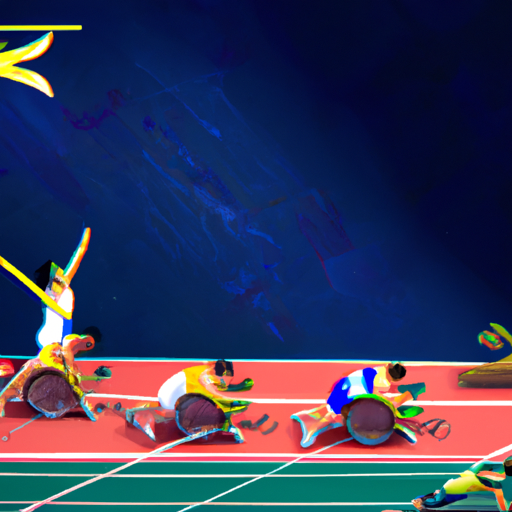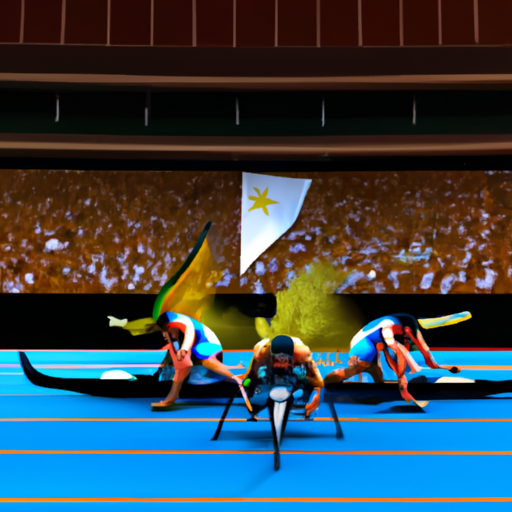Filipino paralympic athletes hailed in Senate

Inspiring Stories of Filipino Paralympic Athletes
Filipino Paralympic athletes were recently hailed in the Senate, showcasing their inspiring stories of determination and triumph. These athletes have overcome tremendous challenges and have proven that disability is not a hindrance to achieving greatness.
One such athlete is Ernie Gawilan, a swimmer who was born without legs and one arm. Despite his physical limitations, Gawilan has become a force to be reckoned with in the world of Paralympic swimming. He has won numerous medals and has set several records in various international competitions. Gawilan’s story is a testament to the power of perseverance and the human spirit.
Another remarkable athlete is Josephine Medina, a table tennis player who was diagnosed with polio at a young age. Despite her disability, Medina has become a formidable competitor in the Paralympic table tennis scene. She has represented the Philippines in multiple international tournaments and has brought home several medals. Medina’s story is a reminder that with determination and hard work, anything is possible.
The Senate’s recognition of these athletes is a significant step towards raising awareness and promoting inclusivity for persons with disabilities. It sends a powerful message that disability should not define a person’s capabilities or limit their opportunities. These athletes have shown that with the right support and opportunities, they can excel in their chosen fields and make their country proud.
The achievements of Filipino Paralympic athletes also highlight the importance of sports in promoting physical and mental well-being. Engaging in sports not only helps individuals stay fit and healthy but also builds character and resilience. It teaches valuable life skills such as discipline, teamwork, and perseverance. By showcasing their talents on the international stage, these athletes inspire others to pursue their dreams and overcome their own challenges.
In addition to their athletic achievements, these athletes also serve as role models and advocates for persons with disabilities. They use their platform to raise awareness about the rights and needs of individuals with disabilities, and to promote inclusivity in all aspects of society. Their stories inspire others to break down barriers and create a more inclusive and accessible world for everyone.
The Senate’s recognition of these athletes is a testament to the government’s commitment to supporting and empowering persons with disabilities. It is a call to action for society as a whole to create a more inclusive and accessible environment for all. By celebrating the achievements of these athletes, the Senate is sending a clear message that disability should never be a barrier to success.
In conclusion, the recent recognition of Filipino Paralympic athletes in the Senate highlights their inspiring stories of determination and triumph. These athletes have overcome tremendous challenges and have proven that disability is not a hindrance to achieving greatness. Their achievements serve as a reminder that with the right support and opportunities, individuals with disabilities can excel in their chosen fields and make their country proud. The Senate’s recognition also promotes inclusivity and raises awareness about the rights and needs of persons with disabilities. These athletes serve as role models and advocates, inspiring others to break down barriers and create a more inclusive and accessible world for everyone.
Recognition and Support for Filipino Paralympic Athletes

Filipino Paralympic athletes were recently hailed in the Senate, receiving recognition and support for their outstanding achievements. The Senate, in a unanimous decision, passed a resolution commending these athletes for their dedication, perseverance, and exceptional performance in various international sporting events.
The resolution highlighted the remarkable accomplishments of Filipino Paralympic athletes, who have consistently brought honor and pride to the country. These athletes have overcome physical limitations and disabilities to excel in their respective sports, proving that determination and hard work can lead to success.
One of the athletes recognized by the Senate was Josephine Medina, a table tennis player who won a bronze medal in the 2016 Paralympic Games held in Rio de Janeiro, Brazil. Medina’s achievement was particularly significant as it was the first-ever Paralympic medal won by a Filipino table tennis player. Her success served as an inspiration to aspiring athletes with disabilities, showing them that they too can achieve greatness in their chosen fields.
Another athlete acknowledged by the Senate was Ernie Gawilan, a swimmer who competed in the 2018 Asian Para Games in Jakarta, Indonesia. Gawilan, who was born without legs and one arm, won three gold medals and set a new Asian record in the 200-meter individual medley event. His remarkable performance not only brought glory to the Philippines but also shattered stereotypes and proved that disability is not a hindrance to success.
The Senate resolution also emphasized the need for continued support and recognition for Filipino Paralympic athletes. It called on the government and private sector to provide adequate funding, training facilities, and coaching staff to help these athletes reach their full potential. The resolution also urged the inclusion of Paralympic sports in school curricula to promote inclusivity and raise awareness about the abilities and achievements of athletes with disabilities.
In addition to the Senate’s recognition, various organizations and individuals have also expressed their support for Filipino Paralympic athletes. The Philippine Sports Commission (PSC) has been actively providing financial assistance, training programs, and equipment to help these athletes prepare for international competitions. Private companies and foundations have also stepped up, offering sponsorships and scholarships to support the training and development of Paralympic athletes.
The recognition and support for Filipino Paralympic athletes are crucial in fostering an inclusive and supportive environment for athletes with disabilities. It sends a powerful message that their achievements are valued and celebrated, and that they have the same opportunities as able-bodied athletes to excel in their chosen sports.
The Senate’s resolution serves as a reminder that disability should never be a barrier to success. It highlights the importance of recognizing and supporting the talents and abilities of individuals with disabilities, and the role they play in promoting inclusivity and diversity in sports.
As the nation continues to celebrate the achievements of Filipino Paralympic athletes, it is hoped that their success will inspire more individuals with disabilities to pursue their dreams and overcome any obstacles they may face. With continued recognition and support, Filipino Paralympic athletes will undoubtedly continue to bring honor and pride to the country, proving that they are truly champions in their own right.
The Importance of Inclusion and Accessibility in Sports
Filipino paralympic athletes were recently hailed in the Senate, highlighting the importance of inclusion and accessibility in sports. This recognition serves as a reminder that everyone, regardless of their physical abilities, should have the opportunity to participate and excel in sports.
Inclusion and accessibility in sports are crucial for several reasons. Firstly, it promotes equality and breaks down barriers. When individuals with disabilities are given the chance to participate in sports, it sends a powerful message that they are valued members of society. It challenges the notion that physical limitations should define a person’s worth or potential.
Moreover, inclusion and accessibility in sports provide numerous physical and mental health benefits. Regular physical activity is essential for maintaining a healthy lifestyle, and sports offer a fun and engaging way to achieve this. For individuals with disabilities, participating in sports can also improve their overall well-being, boost self-esteem, and enhance their social skills.
Creating an inclusive and accessible sports environment requires a collective effort from various stakeholders. Government bodies, sports organizations, and communities must work together to ensure that facilities, equipment, and programs are designed to accommodate individuals with disabilities. This may involve making modifications to existing infrastructure, providing adaptive equipment, and offering specialized training for coaches and officials.
In addition to physical accessibility, it is equally important to foster an inclusive and supportive culture within the sports community. This means promoting acceptance, respect, and understanding among athletes, coaches, and spectators. It involves challenging stereotypes and prejudices, and celebrating the achievements of athletes with disabilities.
One way to promote inclusion and accessibility in sports is through adaptive sports programs. These programs are specifically designed to cater to individuals with disabilities, providing them with opportunities to participate in various sports. Adaptive sports may include wheelchair basketball, blind soccer, or amputee football, among others. These programs not only allow individuals with disabilities to engage in sports but also provide a platform for them to showcase their skills and compete at a high level.
Furthermore, inclusive sports events and competitions play a crucial role in promoting awareness and understanding. When individuals with disabilities compete alongside their able-bodied counterparts, it challenges preconceived notions and highlights the capabilities of athletes with disabilities. It also sends a powerful message of unity and solidarity, emphasizing that sports are for everyone.
The recent recognition of Filipino paralympic athletes in the Senate is a significant step towards promoting inclusion and accessibility in sports. It acknowledges the hard work, dedication, and achievements of these athletes, while also inspiring others to pursue their sporting dreams. It serves as a reminder that disability should never be a barrier to success and that everyone deserves an equal opportunity to participate in sports.
In conclusion, inclusion and accessibility in sports are essential for promoting equality, physical and mental well-being, and fostering an inclusive and supportive culture. It requires collaboration and commitment from various stakeholders to ensure that individuals with disabilities have equal access to sports facilities, equipment, and programs. By promoting adaptive sports programs and organizing inclusive events, we can break down barriers and celebrate the achievements of athletes with disabilities. The recent recognition of Filipino paralympic athletes in the Senate is a testament to the importance of inclusion and accessibility in sports and serves as an inspiration for others to embrace the power of sports.

